MGT501: Addressing Social Sustainability in Clothing Retail
VerifiedAdded on 2023/05/28
|9
|1952
|439
Report
AI Summary
This report examines the social sustainability issues present in a clothing manufacturing and retail company operating in a developing country, specifically Pakistan. It identifies ethical differences between developed and developing countries, challenging economic situations, and poor contract enforcement as key issues. The CRAP analysis evaluates the resources used in the report, focusing on currency, reliability, authority, and point of view. Recommendations are provided for addressing working conditions and family burdens through implementing labor laws, setting time limits, and establishing social responsibility programs. The report suggests integrating policies from both the US and Pakistan to accommodate the needs of workers and contractors while upholding ethical standards. This analysis aims to provide a comprehensive understanding of social sustainability challenges and potential solutions for multinational corporations operating in developing countries.
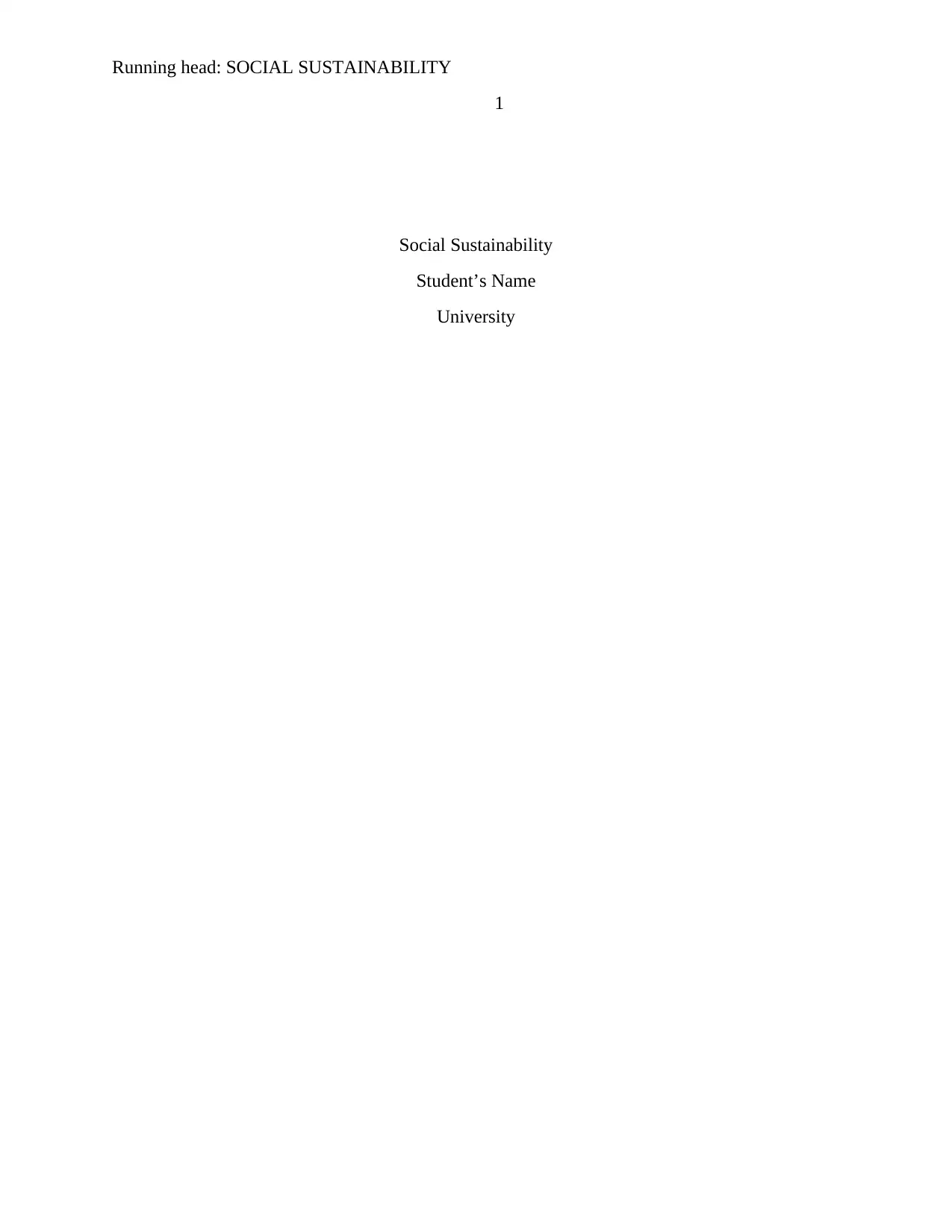
Running head: SOCIAL SUSTAINABILITY
1
Social Sustainability
Student’s Name
University
1
Social Sustainability
Student’s Name
University
Paraphrase This Document
Need a fresh take? Get an instant paraphrase of this document with our AI Paraphraser
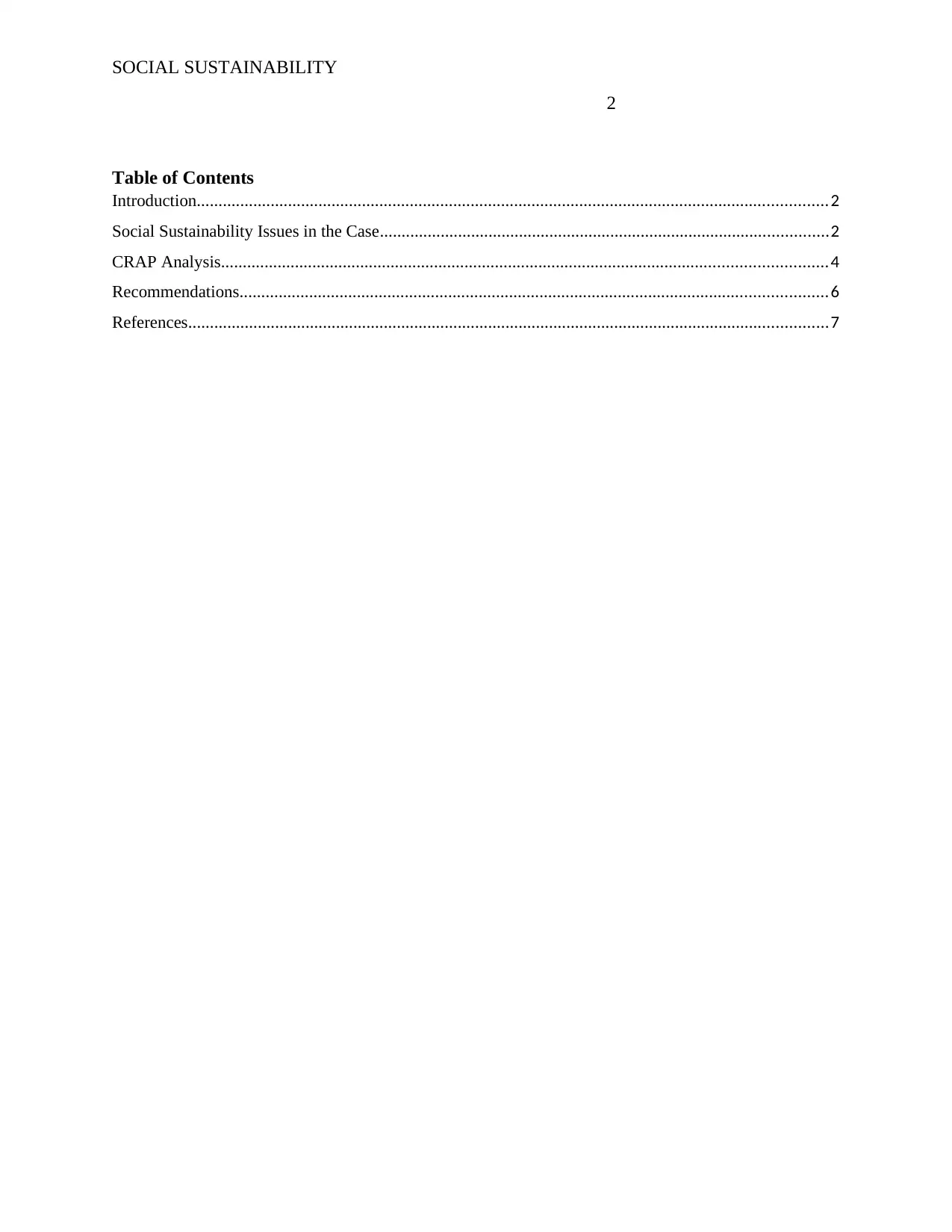
SOCIAL SUSTAINABILITY
2
Table of Contents
Introduction.................................................................................................................................................2
Social Sustainability Issues in the Case.......................................................................................................2
CRAP Analysis...........................................................................................................................................4
Recommendations.......................................................................................................................................6
References...................................................................................................................................................7
2
Table of Contents
Introduction.................................................................................................................................................2
Social Sustainability Issues in the Case.......................................................................................................2
CRAP Analysis...........................................................................................................................................4
Recommendations.......................................................................................................................................6
References...................................................................................................................................................7
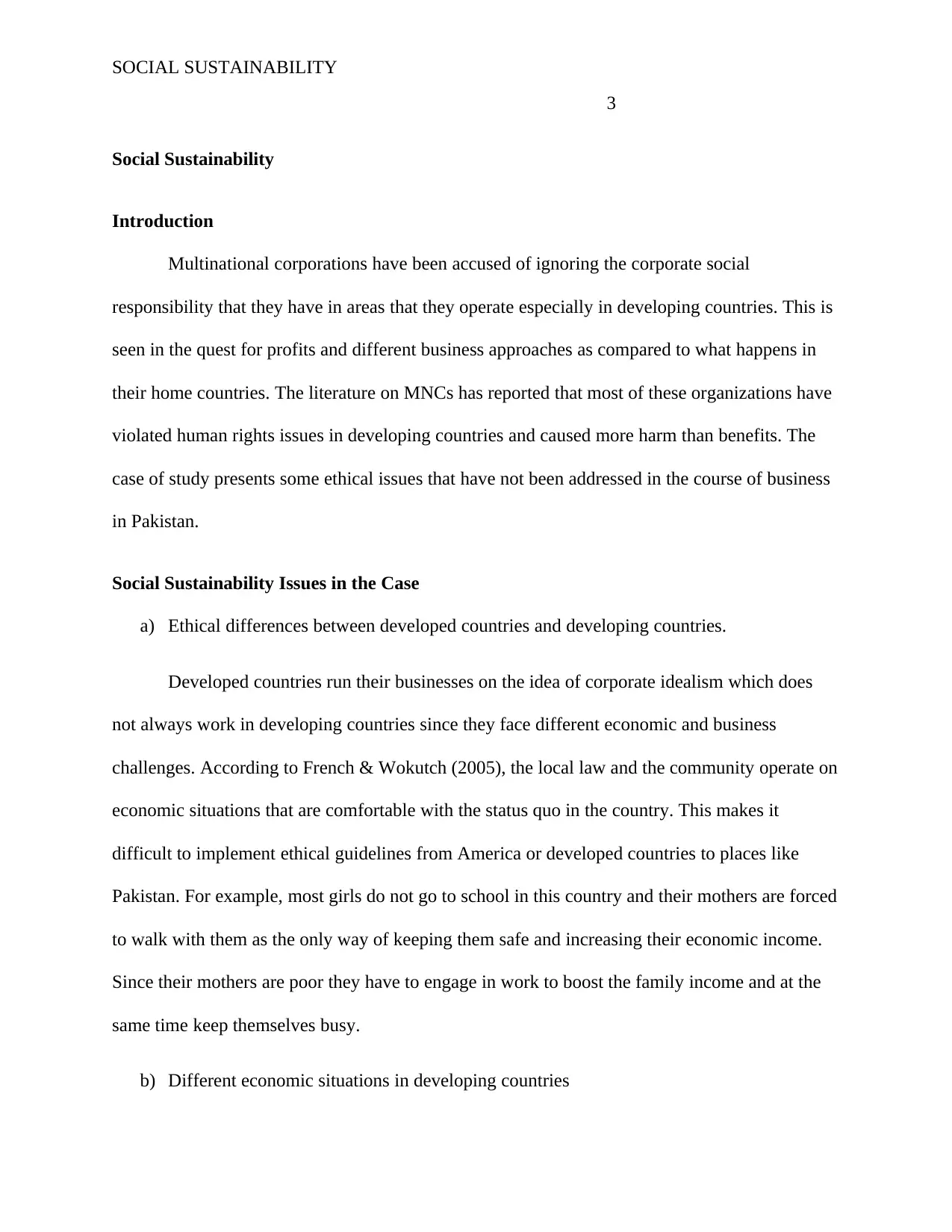
SOCIAL SUSTAINABILITY
3
Social Sustainability
Introduction
Multinational corporations have been accused of ignoring the corporate social
responsibility that they have in areas that they operate especially in developing countries. This is
seen in the quest for profits and different business approaches as compared to what happens in
their home countries. The literature on MNCs has reported that most of these organizations have
violated human rights issues in developing countries and caused more harm than benefits. The
case of study presents some ethical issues that have not been addressed in the course of business
in Pakistan.
Social Sustainability Issues in the Case
a) Ethical differences between developed countries and developing countries.
Developed countries run their businesses on the idea of corporate idealism which does
not always work in developing countries since they face different economic and business
challenges. According to French & Wokutch (2005), the local law and the community operate on
economic situations that are comfortable with the status quo in the country. This makes it
difficult to implement ethical guidelines from America or developed countries to places like
Pakistan. For example, most girls do not go to school in this country and their mothers are forced
to walk with them as the only way of keeping them safe and increasing their economic income.
Since their mothers are poor they have to engage in work to boost the family income and at the
same time keep themselves busy.
b) Different economic situations in developing countries
3
Social Sustainability
Introduction
Multinational corporations have been accused of ignoring the corporate social
responsibility that they have in areas that they operate especially in developing countries. This is
seen in the quest for profits and different business approaches as compared to what happens in
their home countries. The literature on MNCs has reported that most of these organizations have
violated human rights issues in developing countries and caused more harm than benefits. The
case of study presents some ethical issues that have not been addressed in the course of business
in Pakistan.
Social Sustainability Issues in the Case
a) Ethical differences between developed countries and developing countries.
Developed countries run their businesses on the idea of corporate idealism which does
not always work in developing countries since they face different economic and business
challenges. According to French & Wokutch (2005), the local law and the community operate on
economic situations that are comfortable with the status quo in the country. This makes it
difficult to implement ethical guidelines from America or developed countries to places like
Pakistan. For example, most girls do not go to school in this country and their mothers are forced
to walk with them as the only way of keeping them safe and increasing their economic income.
Since their mothers are poor they have to engage in work to boost the family income and at the
same time keep themselves busy.
b) Different economic situations in developing countries
⊘ This is a preview!⊘
Do you want full access?
Subscribe today to unlock all pages.

Trusted by 1+ million students worldwide
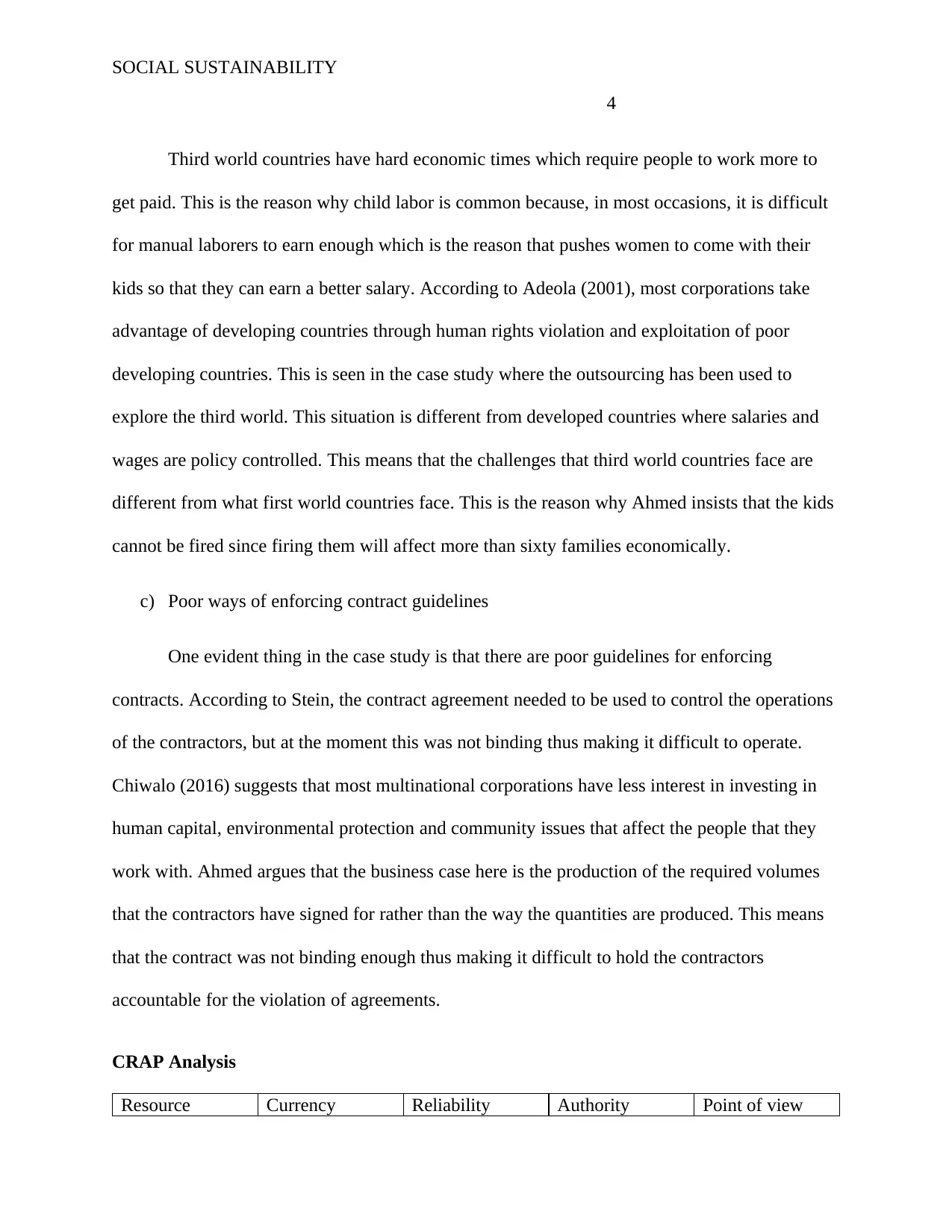
SOCIAL SUSTAINABILITY
4
Third world countries have hard economic times which require people to work more to
get paid. This is the reason why child labor is common because, in most occasions, it is difficult
for manual laborers to earn enough which is the reason that pushes women to come with their
kids so that they can earn a better salary. According to Adeola (2001), most corporations take
advantage of developing countries through human rights violation and exploitation of poor
developing countries. This is seen in the case study where the outsourcing has been used to
explore the third world. This situation is different from developed countries where salaries and
wages are policy controlled. This means that the challenges that third world countries face are
different from what first world countries face. This is the reason why Ahmed insists that the kids
cannot be fired since firing them will affect more than sixty families economically.
c) Poor ways of enforcing contract guidelines
One evident thing in the case study is that there are poor guidelines for enforcing
contracts. According to Stein, the contract agreement needed to be used to control the operations
of the contractors, but at the moment this was not binding thus making it difficult to operate.
Chiwalo (2016) suggests that most multinational corporations have less interest in investing in
human capital, environmental protection and community issues that affect the people that they
work with. Ahmed argues that the business case here is the production of the required volumes
that the contractors have signed for rather than the way the quantities are produced. This means
that the contract was not binding enough thus making it difficult to hold the contractors
accountable for the violation of agreements.
CRAP Analysis
Resource Currency Reliability Authority Point of view
4
Third world countries have hard economic times which require people to work more to
get paid. This is the reason why child labor is common because, in most occasions, it is difficult
for manual laborers to earn enough which is the reason that pushes women to come with their
kids so that they can earn a better salary. According to Adeola (2001), most corporations take
advantage of developing countries through human rights violation and exploitation of poor
developing countries. This is seen in the case study where the outsourcing has been used to
explore the third world. This situation is different from developed countries where salaries and
wages are policy controlled. This means that the challenges that third world countries face are
different from what first world countries face. This is the reason why Ahmed insists that the kids
cannot be fired since firing them will affect more than sixty families economically.
c) Poor ways of enforcing contract guidelines
One evident thing in the case study is that there are poor guidelines for enforcing
contracts. According to Stein, the contract agreement needed to be used to control the operations
of the contractors, but at the moment this was not binding thus making it difficult to operate.
Chiwalo (2016) suggests that most multinational corporations have less interest in investing in
human capital, environmental protection and community issues that affect the people that they
work with. Ahmed argues that the business case here is the production of the required volumes
that the contractors have signed for rather than the way the quantities are produced. This means
that the contract was not binding enough thus making it difficult to hold the contractors
accountable for the violation of agreements.
CRAP Analysis
Resource Currency Reliability Authority Point of view
Paraphrase This Document
Need a fresh take? Get an instant paraphrase of this document with our AI Paraphraser
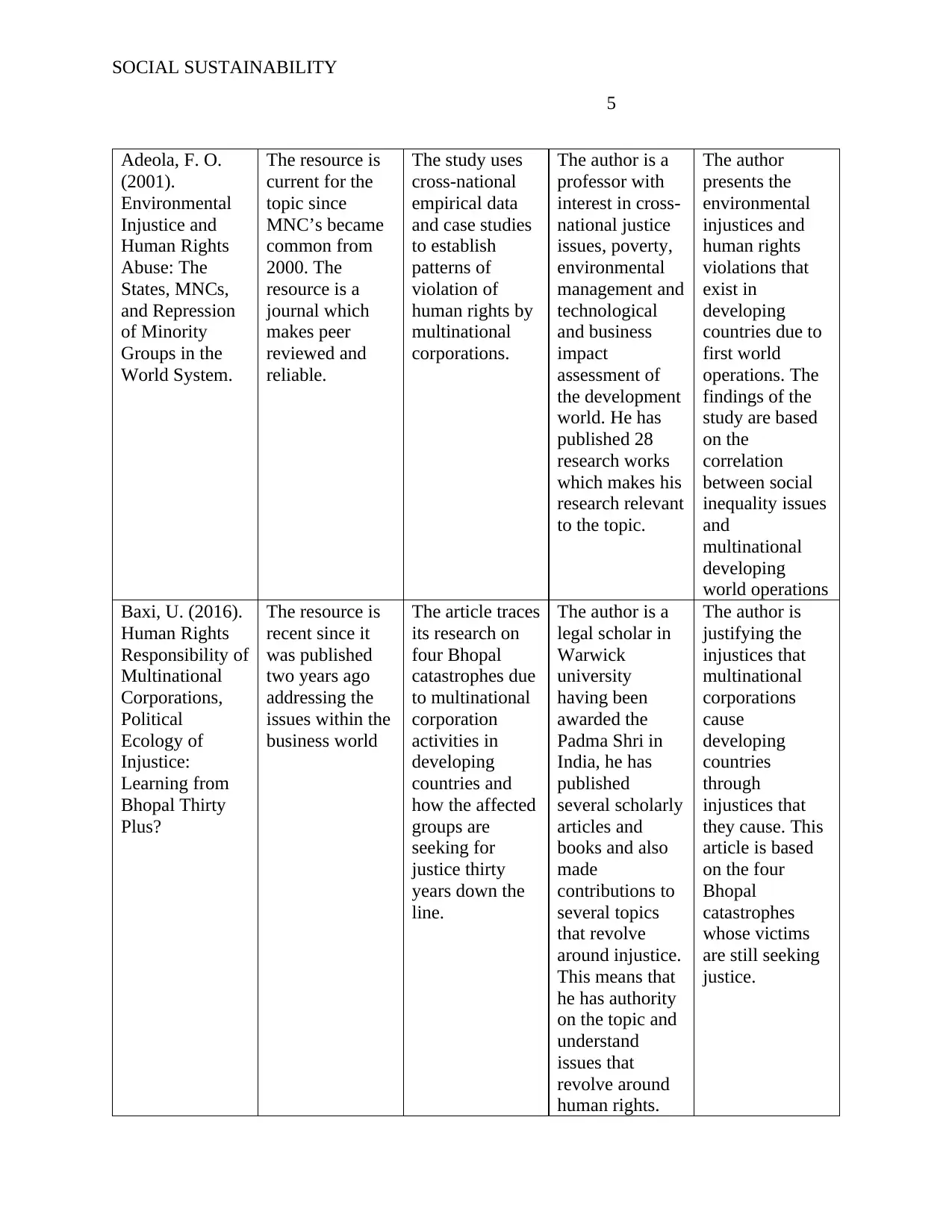
SOCIAL SUSTAINABILITY
5
Adeola, F. O.
(2001).
Environmental
Injustice and
Human Rights
Abuse: The
States, MNCs,
and Repression
of Minority
Groups in the
World System.
The resource is
current for the
topic since
MNC’s became
common from
2000. The
resource is a
journal which
makes peer
reviewed and
reliable.
The study uses
cross-national
empirical data
and case studies
to establish
patterns of
violation of
human rights by
multinational
corporations.
The author is a
professor with
interest in cross-
national justice
issues, poverty,
environmental
management and
technological
and business
impact
assessment of
the development
world. He has
published 28
research works
which makes his
research relevant
to the topic.
The author
presents the
environmental
injustices and
human rights
violations that
exist in
developing
countries due to
first world
operations. The
findings of the
study are based
on the
correlation
between social
inequality issues
and
multinational
developing
world operations
Baxi, U. (2016).
Human Rights
Responsibility of
Multinational
Corporations,
Political
Ecology of
Injustice:
Learning from
Bhopal Thirty
Plus?
The resource is
recent since it
was published
two years ago
addressing the
issues within the
business world
The article traces
its research on
four Bhopal
catastrophes due
to multinational
corporation
activities in
developing
countries and
how the affected
groups are
seeking for
justice thirty
years down the
line.
The author is a
legal scholar in
Warwick
university
having been
awarded the
Padma Shri in
India, he has
published
several scholarly
articles and
books and also
made
contributions to
several topics
that revolve
around injustice.
This means that
he has authority
on the topic and
understand
issues that
revolve around
human rights.
The author is
justifying the
injustices that
multinational
corporations
cause
developing
countries
through
injustices that
they cause. This
article is based
on the four
Bhopal
catastrophes
whose victims
are still seeking
justice.
5
Adeola, F. O.
(2001).
Environmental
Injustice and
Human Rights
Abuse: The
States, MNCs,
and Repression
of Minority
Groups in the
World System.
The resource is
current for the
topic since
MNC’s became
common from
2000. The
resource is a
journal which
makes peer
reviewed and
reliable.
The study uses
cross-national
empirical data
and case studies
to establish
patterns of
violation of
human rights by
multinational
corporations.
The author is a
professor with
interest in cross-
national justice
issues, poverty,
environmental
management and
technological
and business
impact
assessment of
the development
world. He has
published 28
research works
which makes his
research relevant
to the topic.
The author
presents the
environmental
injustices and
human rights
violations that
exist in
developing
countries due to
first world
operations. The
findings of the
study are based
on the
correlation
between social
inequality issues
and
multinational
developing
world operations
Baxi, U. (2016).
Human Rights
Responsibility of
Multinational
Corporations,
Political
Ecology of
Injustice:
Learning from
Bhopal Thirty
Plus?
The resource is
recent since it
was published
two years ago
addressing the
issues within the
business world
The article traces
its research on
four Bhopal
catastrophes due
to multinational
corporation
activities in
developing
countries and
how the affected
groups are
seeking for
justice thirty
years down the
line.
The author is a
legal scholar in
Warwick
university
having been
awarded the
Padma Shri in
India, he has
published
several scholarly
articles and
books and also
made
contributions to
several topics
that revolve
around injustice.
This means that
he has authority
on the topic and
understand
issues that
revolve around
human rights.
The author is
justifying the
injustices that
multinational
corporations
cause
developing
countries
through
injustices that
they cause. This
article is based
on the four
Bhopal
catastrophes
whose victims
are still seeking
justice.
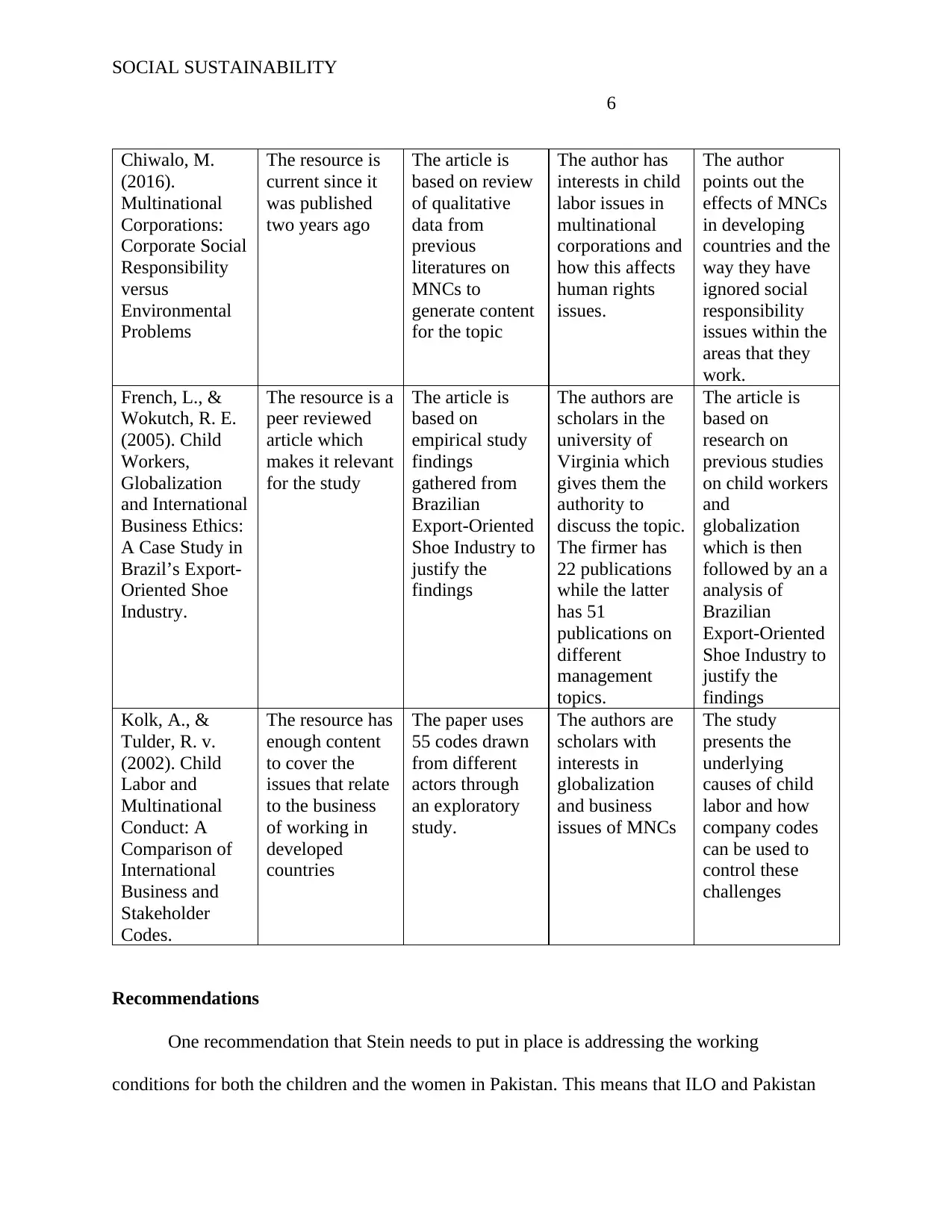
SOCIAL SUSTAINABILITY
6
Chiwalo, M.
(2016).
Multinational
Corporations:
Corporate Social
Responsibility
versus
Environmental
Problems
The resource is
current since it
was published
two years ago
The article is
based on review
of qualitative
data from
previous
literatures on
MNCs to
generate content
for the topic
The author has
interests in child
labor issues in
multinational
corporations and
how this affects
human rights
issues.
The author
points out the
effects of MNCs
in developing
countries and the
way they have
ignored social
responsibility
issues within the
areas that they
work.
French, L., &
Wokutch, R. E.
(2005). Child
Workers,
Globalization
and International
Business Ethics:
A Case Study in
Brazil’s Export-
Oriented Shoe
Industry.
The resource is a
peer reviewed
article which
makes it relevant
for the study
The article is
based on
empirical study
findings
gathered from
Brazilian
Export-Oriented
Shoe Industry to
justify the
findings
The authors are
scholars in the
university of
Virginia which
gives them the
authority to
discuss the topic.
The firmer has
22 publications
while the latter
has 51
publications on
different
management
topics.
The article is
based on
research on
previous studies
on child workers
and
globalization
which is then
followed by an a
analysis of
Brazilian
Export-Oriented
Shoe Industry to
justify the
findings
Kolk, A., &
Tulder, R. v.
(2002). Child
Labor and
Multinational
Conduct: A
Comparison of
International
Business and
Stakeholder
Codes.
The resource has
enough content
to cover the
issues that relate
to the business
of working in
developed
countries
The paper uses
55 codes drawn
from different
actors through
an exploratory
study.
The authors are
scholars with
interests in
globalization
and business
issues of MNCs
The study
presents the
underlying
causes of child
labor and how
company codes
can be used to
control these
challenges
Recommendations
One recommendation that Stein needs to put in place is addressing the working
conditions for both the children and the women in Pakistan. This means that ILO and Pakistan
6
Chiwalo, M.
(2016).
Multinational
Corporations:
Corporate Social
Responsibility
versus
Environmental
Problems
The resource is
current since it
was published
two years ago
The article is
based on review
of qualitative
data from
previous
literatures on
MNCs to
generate content
for the topic
The author has
interests in child
labor issues in
multinational
corporations and
how this affects
human rights
issues.
The author
points out the
effects of MNCs
in developing
countries and the
way they have
ignored social
responsibility
issues within the
areas that they
work.
French, L., &
Wokutch, R. E.
(2005). Child
Workers,
Globalization
and International
Business Ethics:
A Case Study in
Brazil’s Export-
Oriented Shoe
Industry.
The resource is a
peer reviewed
article which
makes it relevant
for the study
The article is
based on
empirical study
findings
gathered from
Brazilian
Export-Oriented
Shoe Industry to
justify the
findings
The authors are
scholars in the
university of
Virginia which
gives them the
authority to
discuss the topic.
The firmer has
22 publications
while the latter
has 51
publications on
different
management
topics.
The article is
based on
research on
previous studies
on child workers
and
globalization
which is then
followed by an a
analysis of
Brazilian
Export-Oriented
Shoe Industry to
justify the
findings
Kolk, A., &
Tulder, R. v.
(2002). Child
Labor and
Multinational
Conduct: A
Comparison of
International
Business and
Stakeholder
Codes.
The resource has
enough content
to cover the
issues that relate
to the business
of working in
developed
countries
The paper uses
55 codes drawn
from different
actors through
an exploratory
study.
The authors are
scholars with
interests in
globalization
and business
issues of MNCs
The study
presents the
underlying
causes of child
labor and how
company codes
can be used to
control these
challenges
Recommendations
One recommendation that Stein needs to put in place is addressing the working
conditions for both the children and the women in Pakistan. This means that ILO and Pakistan
⊘ This is a preview!⊘
Do you want full access?
Subscribe today to unlock all pages.

Trusted by 1+ million students worldwide
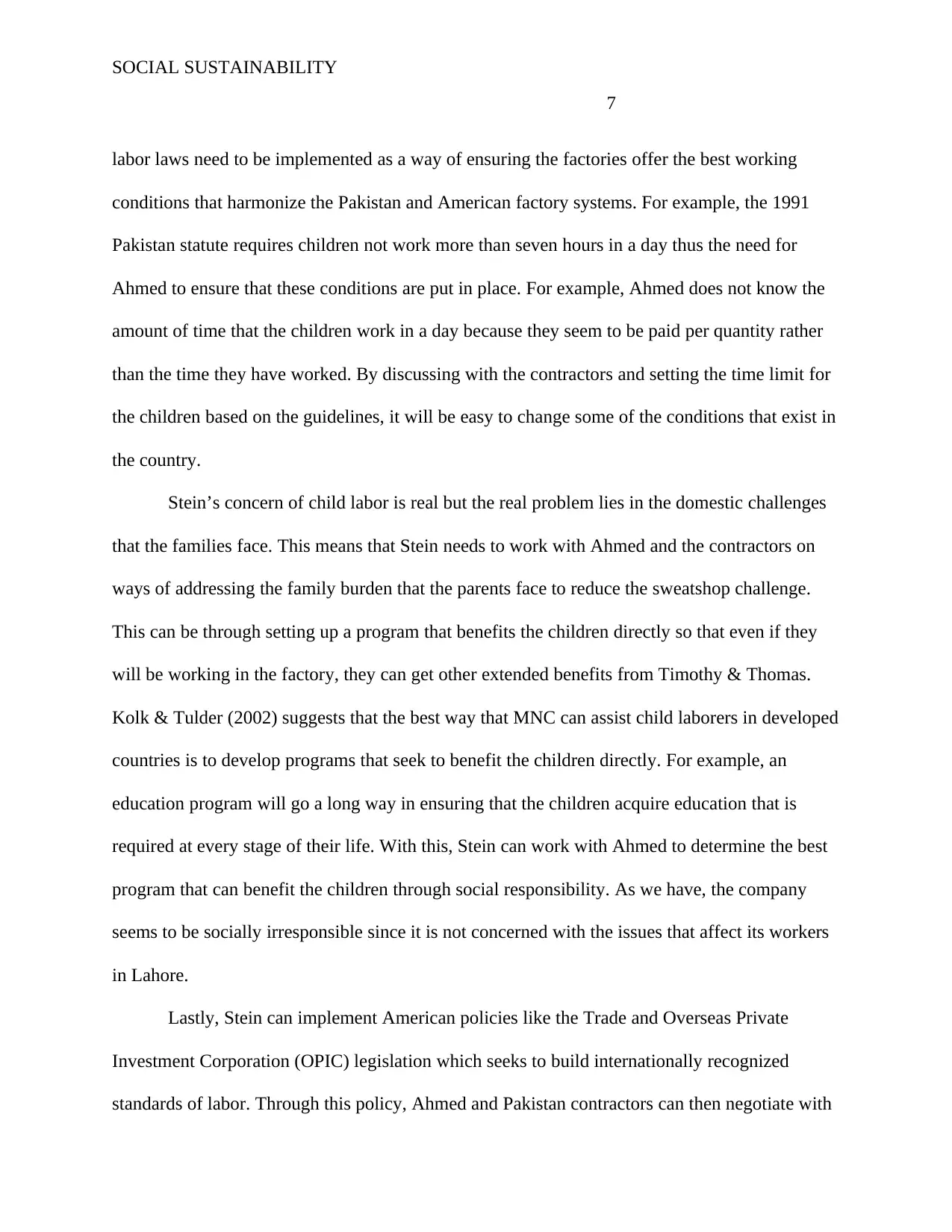
SOCIAL SUSTAINABILITY
7
labor laws need to be implemented as a way of ensuring the factories offer the best working
conditions that harmonize the Pakistan and American factory systems. For example, the 1991
Pakistan statute requires children not work more than seven hours in a day thus the need for
Ahmed to ensure that these conditions are put in place. For example, Ahmed does not know the
amount of time that the children work in a day because they seem to be paid per quantity rather
than the time they have worked. By discussing with the contractors and setting the time limit for
the children based on the guidelines, it will be easy to change some of the conditions that exist in
the country.
Stein’s concern of child labor is real but the real problem lies in the domestic challenges
that the families face. This means that Stein needs to work with Ahmed and the contractors on
ways of addressing the family burden that the parents face to reduce the sweatshop challenge.
This can be through setting up a program that benefits the children directly so that even if they
will be working in the factory, they can get other extended benefits from Timothy & Thomas.
Kolk & Tulder (2002) suggests that the best way that MNC can assist child laborers in developed
countries is to develop programs that seek to benefit the children directly. For example, an
education program will go a long way in ensuring that the children acquire education that is
required at every stage of their life. With this, Stein can work with Ahmed to determine the best
program that can benefit the children through social responsibility. As we have, the company
seems to be socially irresponsible since it is not concerned with the issues that affect its workers
in Lahore.
Lastly, Stein can implement American policies like the Trade and Overseas Private
Investment Corporation (OPIC) legislation which seeks to build internationally recognized
standards of labor. Through this policy, Ahmed and Pakistan contractors can then negotiate with
7
labor laws need to be implemented as a way of ensuring the factories offer the best working
conditions that harmonize the Pakistan and American factory systems. For example, the 1991
Pakistan statute requires children not work more than seven hours in a day thus the need for
Ahmed to ensure that these conditions are put in place. For example, Ahmed does not know the
amount of time that the children work in a day because they seem to be paid per quantity rather
than the time they have worked. By discussing with the contractors and setting the time limit for
the children based on the guidelines, it will be easy to change some of the conditions that exist in
the country.
Stein’s concern of child labor is real but the real problem lies in the domestic challenges
that the families face. This means that Stein needs to work with Ahmed and the contractors on
ways of addressing the family burden that the parents face to reduce the sweatshop challenge.
This can be through setting up a program that benefits the children directly so that even if they
will be working in the factory, they can get other extended benefits from Timothy & Thomas.
Kolk & Tulder (2002) suggests that the best way that MNC can assist child laborers in developed
countries is to develop programs that seek to benefit the children directly. For example, an
education program will go a long way in ensuring that the children acquire education that is
required at every stage of their life. With this, Stein can work with Ahmed to determine the best
program that can benefit the children through social responsibility. As we have, the company
seems to be socially irresponsible since it is not concerned with the issues that affect its workers
in Lahore.
Lastly, Stein can implement American policies like the Trade and Overseas Private
Investment Corporation (OPIC) legislation which seeks to build internationally recognized
standards of labor. Through this policy, Ahmed and Pakistan contractors can then negotiate with
Paraphrase This Document
Need a fresh take? Get an instant paraphrase of this document with our AI Paraphraser
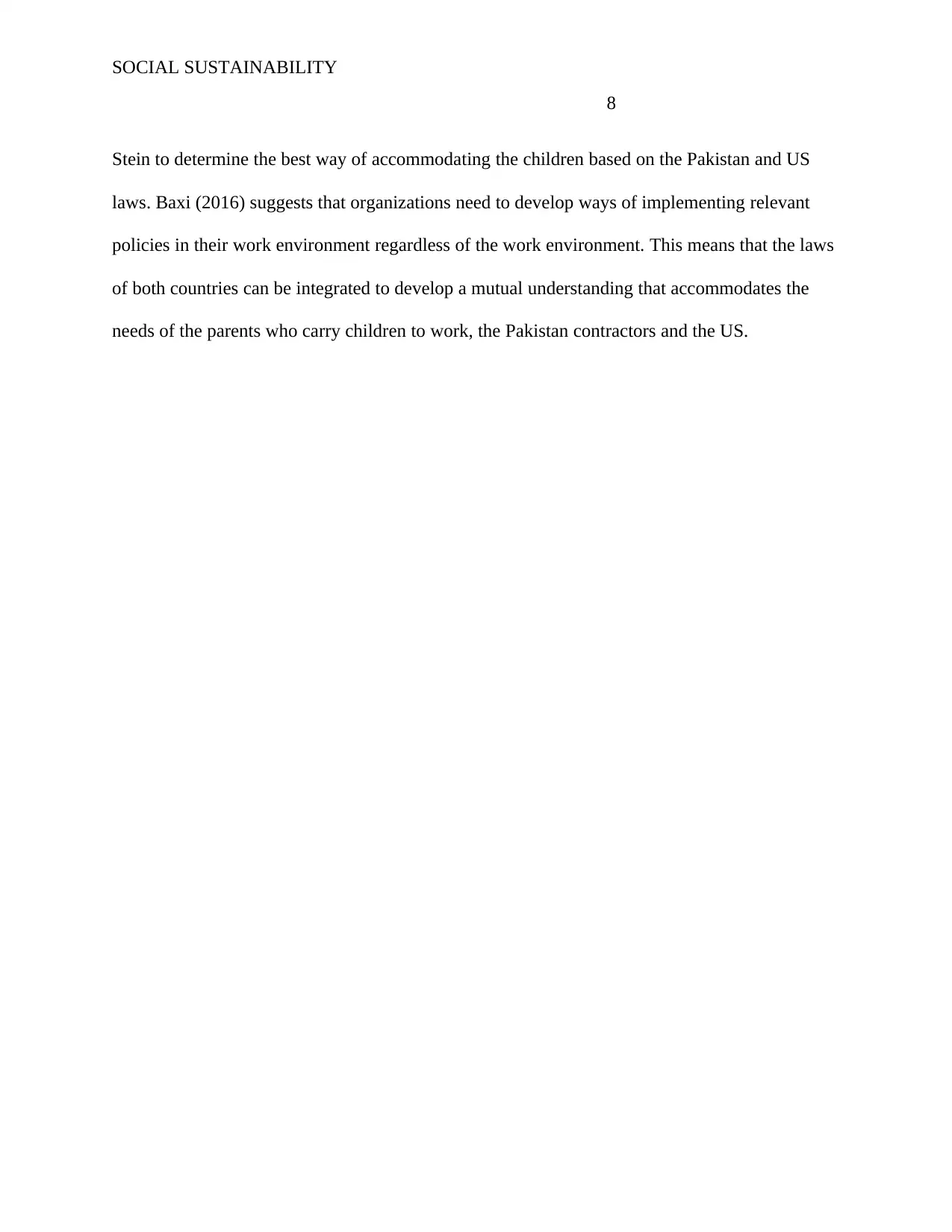
SOCIAL SUSTAINABILITY
8
Stein to determine the best way of accommodating the children based on the Pakistan and US
laws. Baxi (2016) suggests that organizations need to develop ways of implementing relevant
policies in their work environment regardless of the work environment. This means that the laws
of both countries can be integrated to develop a mutual understanding that accommodates the
needs of the parents who carry children to work, the Pakistan contractors and the US.
8
Stein to determine the best way of accommodating the children based on the Pakistan and US
laws. Baxi (2016) suggests that organizations need to develop ways of implementing relevant
policies in their work environment regardless of the work environment. This means that the laws
of both countries can be integrated to develop a mutual understanding that accommodates the
needs of the parents who carry children to work, the Pakistan contractors and the US.
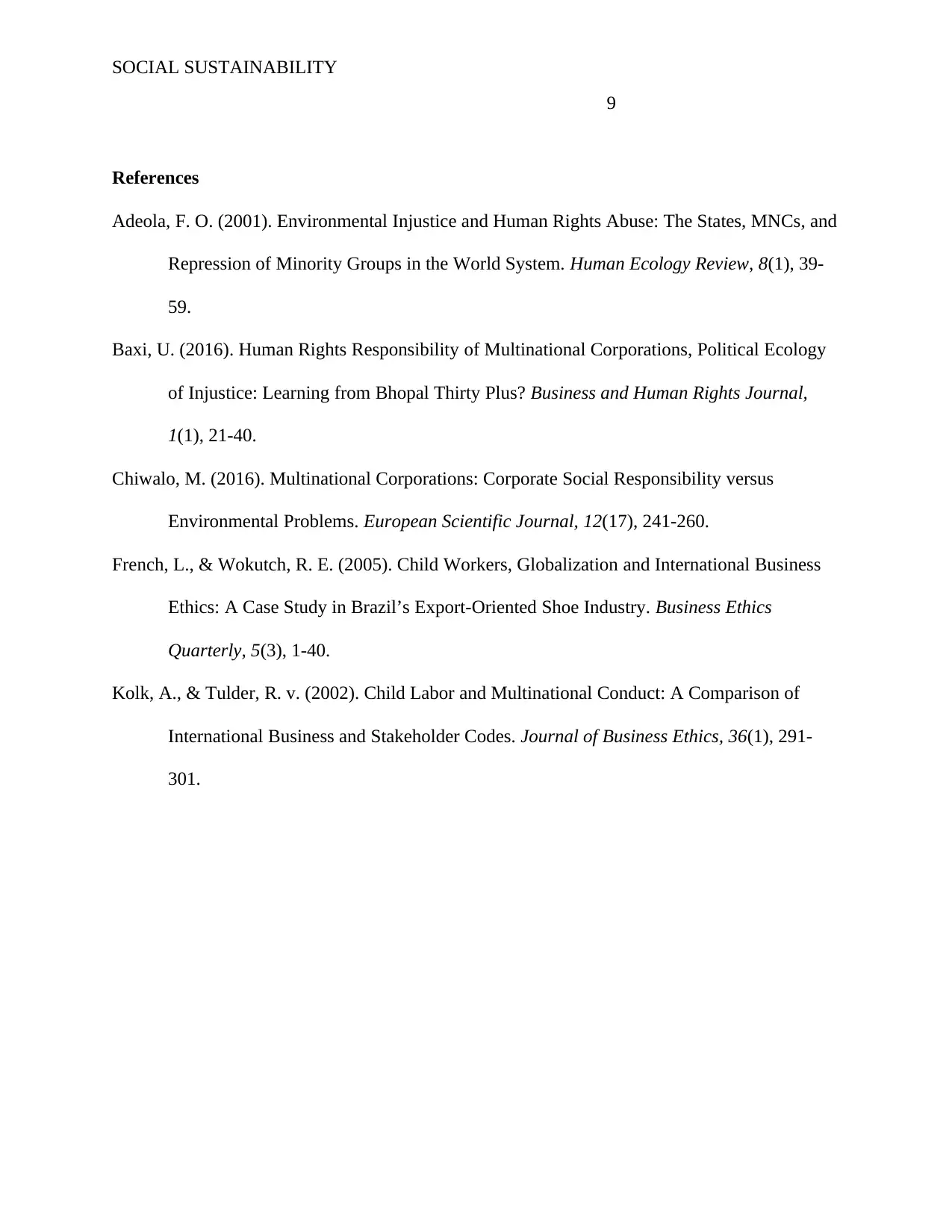
SOCIAL SUSTAINABILITY
9
References
Adeola, F. O. (2001). Environmental Injustice and Human Rights Abuse: The States, MNCs, and
Repression of Minority Groups in the World System. Human Ecology Review, 8(1), 39-
59.
Baxi, U. (2016). Human Rights Responsibility of Multinational Corporations, Political Ecology
of Injustice: Learning from Bhopal Thirty Plus? Business and Human Rights Journal,
1(1), 21-40.
Chiwalo, M. (2016). Multinational Corporations: Corporate Social Responsibility versus
Environmental Problems. European Scientific Journal, 12(17), 241-260.
French, L., & Wokutch, R. E. (2005). Child Workers, Globalization and International Business
Ethics: A Case Study in Brazil’s Export-Oriented Shoe Industry. Business Ethics
Quarterly, 5(3), 1-40.
Kolk, A., & Tulder, R. v. (2002). Child Labor and Multinational Conduct: A Comparison of
International Business and Stakeholder Codes. Journal of Business Ethics, 36(1), 291-
301.
9
References
Adeola, F. O. (2001). Environmental Injustice and Human Rights Abuse: The States, MNCs, and
Repression of Minority Groups in the World System. Human Ecology Review, 8(1), 39-
59.
Baxi, U. (2016). Human Rights Responsibility of Multinational Corporations, Political Ecology
of Injustice: Learning from Bhopal Thirty Plus? Business and Human Rights Journal,
1(1), 21-40.
Chiwalo, M. (2016). Multinational Corporations: Corporate Social Responsibility versus
Environmental Problems. European Scientific Journal, 12(17), 241-260.
French, L., & Wokutch, R. E. (2005). Child Workers, Globalization and International Business
Ethics: A Case Study in Brazil’s Export-Oriented Shoe Industry. Business Ethics
Quarterly, 5(3), 1-40.
Kolk, A., & Tulder, R. v. (2002). Child Labor and Multinational Conduct: A Comparison of
International Business and Stakeholder Codes. Journal of Business Ethics, 36(1), 291-
301.
⊘ This is a preview!⊘
Do you want full access?
Subscribe today to unlock all pages.

Trusted by 1+ million students worldwide
1 out of 9
Related Documents
Your All-in-One AI-Powered Toolkit for Academic Success.
+13062052269
info@desklib.com
Available 24*7 on WhatsApp / Email
![[object Object]](/_next/static/media/star-bottom.7253800d.svg)
Unlock your academic potential
Copyright © 2020–2026 A2Z Services. All Rights Reserved. Developed and managed by ZUCOL.





